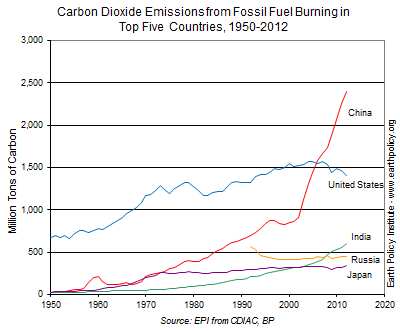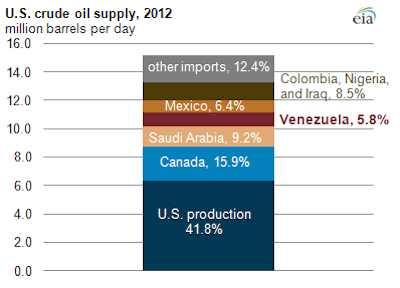By Sierra Rayne ——Bio and Archives--April 29, 2014
Global Warming-Energy-Environment | CFP Comments | Reader Friendly | Subscribe | Email Us

 See Canada on this graph? I didn't think so. And here are the US sources of crude oil by country.
See Canada on this graph? I didn't think so. And here are the US sources of crude oil by country.
 So if the Obama administration is "killing Keystone" because of Canada's "incoherence on climate," then I suspect Obama is also demanding that its other major sources of crude oil imports reduce their GHG emissions as much, if not more than, Canada? Strange how we never hear serious talk of that.
Between 2004 and 2011 (the latest inventory year in the benchmark UN-FCCC database), Canada's total GHG emissions have declined by 7.3 percent to 789 Tg CO2 equivalent (CO2e). Over this timeframe, the USA's total GHG emissions have declined by only 5.9 percent to 5,797 Tg CO2e. Who is the climate laggard?
Between 2006 and 2010 (the latest year in the World Bank database), per capita CO2 emissions in Canada declined 13.1 percent to 14.7 metric tons per capita (mtpc). In the USA, per capita emissions only declined 8.7 percent over this timeframe, and remained far higher (17.6 mtpc) than in Canada. Again, who is the so-called climate laggard?
And what is going on with regard to GHG emission trends in the other major oil sources for the United States? Well, good luck finding out. The UN-FCCC database only includes a single year of data for Venezuela, whereby their total GHG emissions were 178 Tg CO2e way back in 1999. The last UN-FCCC inventory year for Mexico was 2006, when its total emissions were 712 Tg CO2e, an increase of 11 percent from the last available inventory year in 2002.
Saudi Arabia's current emissions are another mystery. The latest UN-FCCC entry for this nation was 2000, when their total GHG emissions were 282 Tg CO2e, up 88 percent since 1990. For perspective, Canada's emissions only increased 26 percent between 1990 and 2000. Saudi Arabia's per capita CO2 emissions are not declining and are at a much higher level (17.0 mtpc) than Canada's.
A review of the true Keystone XL climate incoherence factor being peddled in the media is in order. Since 2004, Canada's GHG emissions are declining, and have declined more rapidly than that of the United States. On a per capita basis, Canada's CO2 emissions are lower than the USA and declining more rapidly. The other primary sources of US oil imports have either entirely unknown GHG emission trends and/or their emissions appear to be rapidly increasing. On top of this incoherence, Canada's GHG emissions are globally irrelevant. Meanwhile, GHG emissions in countries like China and India are absolutely skyrocketing.
So are Obama's delays on Keystone XL really to do with Canada's domestic climate policies? That would be an unequivocal negative.
What do various Canadian academics and politicians -- and even some oil industry players themselves -- suggest Canada do to gain US approval for Keystone XL? Implement a massive carbon tax, of course.
Gas prices in Canada are heading upwards of late, and average prices already range between US$4.33 and US$5.09 per gallon. In Vancouver and Montreal, prices are upwards of US$5.21 per gallon and rising. Natural gas and electricity prices are soaring, as are costs for diesel, home heating oil, and propane. Energy poverty is a real concern. The answer is not carbon taxation, it is less energy taxation and more development of Canada's abundant energy resources -- both for domestic consumption and international export. If Canada's GHG emissions increase, so be it.
The GHG emissions controversy surrounding Keystone XL is just a ruse. There are other political, economic, and geopolitical forces at play that govern the regulatory path for this pipeline. Consumers, who bear the brunt of carbon taxation, should not be thrown under the bus because of misguided energy policy analyses. Build the pipeline, and forget about carbon taxation.
So if the Obama administration is "killing Keystone" because of Canada's "incoherence on climate," then I suspect Obama is also demanding that its other major sources of crude oil imports reduce their GHG emissions as much, if not more than, Canada? Strange how we never hear serious talk of that.
Between 2004 and 2011 (the latest inventory year in the benchmark UN-FCCC database), Canada's total GHG emissions have declined by 7.3 percent to 789 Tg CO2 equivalent (CO2e). Over this timeframe, the USA's total GHG emissions have declined by only 5.9 percent to 5,797 Tg CO2e. Who is the climate laggard?
Between 2006 and 2010 (the latest year in the World Bank database), per capita CO2 emissions in Canada declined 13.1 percent to 14.7 metric tons per capita (mtpc). In the USA, per capita emissions only declined 8.7 percent over this timeframe, and remained far higher (17.6 mtpc) than in Canada. Again, who is the so-called climate laggard?
And what is going on with regard to GHG emission trends in the other major oil sources for the United States? Well, good luck finding out. The UN-FCCC database only includes a single year of data for Venezuela, whereby their total GHG emissions were 178 Tg CO2e way back in 1999. The last UN-FCCC inventory year for Mexico was 2006, when its total emissions were 712 Tg CO2e, an increase of 11 percent from the last available inventory year in 2002.
Saudi Arabia's current emissions are another mystery. The latest UN-FCCC entry for this nation was 2000, when their total GHG emissions were 282 Tg CO2e, up 88 percent since 1990. For perspective, Canada's emissions only increased 26 percent between 1990 and 2000. Saudi Arabia's per capita CO2 emissions are not declining and are at a much higher level (17.0 mtpc) than Canada's.
A review of the true Keystone XL climate incoherence factor being peddled in the media is in order. Since 2004, Canada's GHG emissions are declining, and have declined more rapidly than that of the United States. On a per capita basis, Canada's CO2 emissions are lower than the USA and declining more rapidly. The other primary sources of US oil imports have either entirely unknown GHG emission trends and/or their emissions appear to be rapidly increasing. On top of this incoherence, Canada's GHG emissions are globally irrelevant. Meanwhile, GHG emissions in countries like China and India are absolutely skyrocketing.
So are Obama's delays on Keystone XL really to do with Canada's domestic climate policies? That would be an unequivocal negative.
What do various Canadian academics and politicians -- and even some oil industry players themselves -- suggest Canada do to gain US approval for Keystone XL? Implement a massive carbon tax, of course.
Gas prices in Canada are heading upwards of late, and average prices already range between US$4.33 and US$5.09 per gallon. In Vancouver and Montreal, prices are upwards of US$5.21 per gallon and rising. Natural gas and electricity prices are soaring, as are costs for diesel, home heating oil, and propane. Energy poverty is a real concern. The answer is not carbon taxation, it is less energy taxation and more development of Canada's abundant energy resources -- both for domestic consumption and international export. If Canada's GHG emissions increase, so be it.
The GHG emissions controversy surrounding Keystone XL is just a ruse. There are other political, economic, and geopolitical forces at play that govern the regulatory path for this pipeline. Consumers, who bear the brunt of carbon taxation, should not be thrown under the bus because of misguided energy policy analyses. Build the pipeline, and forget about carbon taxation.View Comments
Sierra Rayne holds a Ph.D. in Chemistry and writes regularly on environment, energy, and national security topics. He can be found on Twitter at @srayne_ca